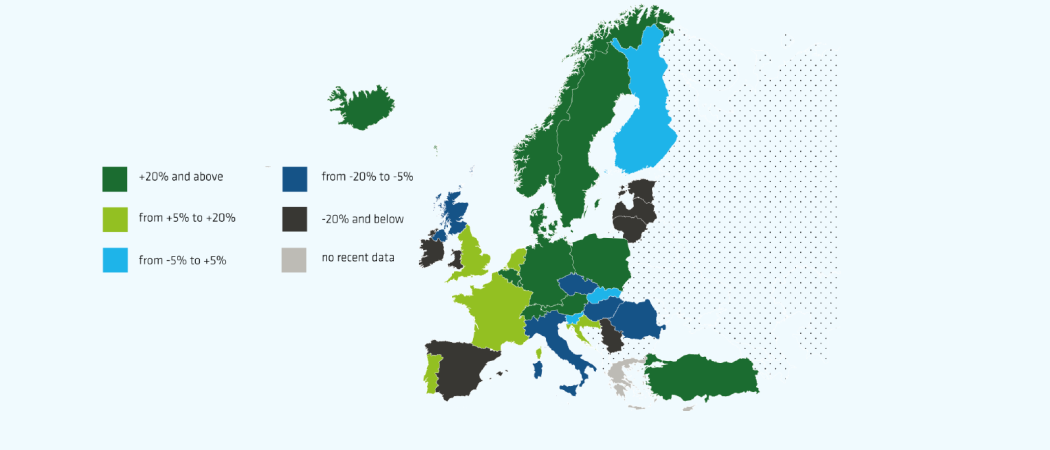Finding a compromise on the EU’s next budget is no doubt a highly complex task. But after the lean years since the 2008 crash, there must be a commitment to increasing investment in research, innovation and higher education

EUA data shows that only 12 countries, have an average annual university funding growth rate higher than their average annual GDP growth over the last decade. The map shows the inflation-adjusted change in public funding to universities in 2018 compared to 2008. Top investors appear in dark green, countries with biggest decrease in funding appear in black.
Monitoring public funding to universities allows us to see how future-proofed our knowledge economies really are in Europe. The latest release of the European University Association (EUA) Public Funding Observatory, with data from 34 national university associations, provides valuable insight, shedding light on the constrained environment in which universities operate and deliver on their mission. It also serves to underline the crucial need for ambitious European investment in research, innovation and education.
The commitment of governments to higher education and research can be analysed from the perspective of funding in relation to economic growth. The EUA data shows that only 12 countries, including Austria, Croatia, Germany and Portugal, have an average annual funding growth rate higher than their average annual GDP growth over the last decade. A few countries, like Poland, Hungary and Slovenia, have been investing at a lower rate than their significant economic growth would suggest they should. In fact, there is potential in central and eastern Europe, where several countries including the Czech Republic, Romania and Slovakia, have yet to channel economic growth into re-funding higher education and research. Ireland, meanwhile, has only recently started to increase funding for the sector, despite steady post-crisis economic growth.
Higher education and research are treated differently by governments across Europe, despite representing the opportunity for people and future-oriented investments that support long-term societal development.
In fact, the entire sector is under increasing pressure, because rising costs mean that, in many cases, even significant investments may be quickly eaten up to simply maintain activity levels. In more than half of the countries and systems reviewed by EUA, student numbers have been rising dramatically in the last decade – nearing a 50 per cent increase in Denmark or Flanders, for instance.
Few countries keep up with the pace. Iceland, Norway, Portugal and Sweden have seen overall funding increases (in real terms) that exceed the growth of student numbers. The most critical cases are in Ireland, Romania and Serbia, where funding cuts have worsened operating conditions for universities, while student numbers have grown.
At the same time, most of the EU-13 countries (except for Croatia and Romania) continue to experience steep declines in student numbers, jeopardising the longer-term societal and economic development of these countries. All in all, the core missions of universities are under pressure, any money coming is likely to be used to deal with existing problems, rather than to promote further development of the sector.
Years of under-funding have also left their mark on the university campuses. Infrastructure has not been a target for investment and in many cases, ‘the campus’ is considered a challenge rather than an opportunity. Moving forward and developing sustainable campuses is nevertheless high on the agenda of university leaders, who view this as a renewed priority in the context of the green transition. In this context, the EU’s Green Deal will have a direct impact on universities, just as they themselves will be a direct contributor to this new growth strategy. The Green Deal will be “science-based”, in the words of Kurt Vandenberghe, Ursula von der Leyen’s cabinet member in charge of the initiative. The move underlines the importance of fundamental research in supporting Europe’s sustainable future. Universities will contribute to the effort, carrying out research and educating the future generation. Attention to campus development will also be a must.
There is no shortage of challenges and opportunities for Europe’s universities, but one should be mindful of the uneven playing field and constrained environments in which the sector has been operating over the last decade. Recovery is on its way in various parts of the continent, but the focus on supporting higher education and research has been too limited, despite the potential to underpin and sustain economic growth and societal development over the longer term.
This is the backdrop against which the EU member states are today negotiating the EU’s next seven-year budget. Finding a compromise is no doubt a highly complex task, which naturally calls for concessions. But let us be clear: there is no gain in back-pedalling over investment in research, innovation and higher education. The EU needs all three. It is all about providing universities the means to support Europe, by conducting the necessary research and providing the education and skills that will project our continent confidently in the next decade.
Enora Bennetot Pruvot is Deputy Director Governance, Funding and Public Policy Development at the European University Association





 A unique international forum for public research organisations and companies to connect their external engagement with strategic interests around their R&D system.
A unique international forum for public research organisations and companies to connect their external engagement with strategic interests around their R&D system.